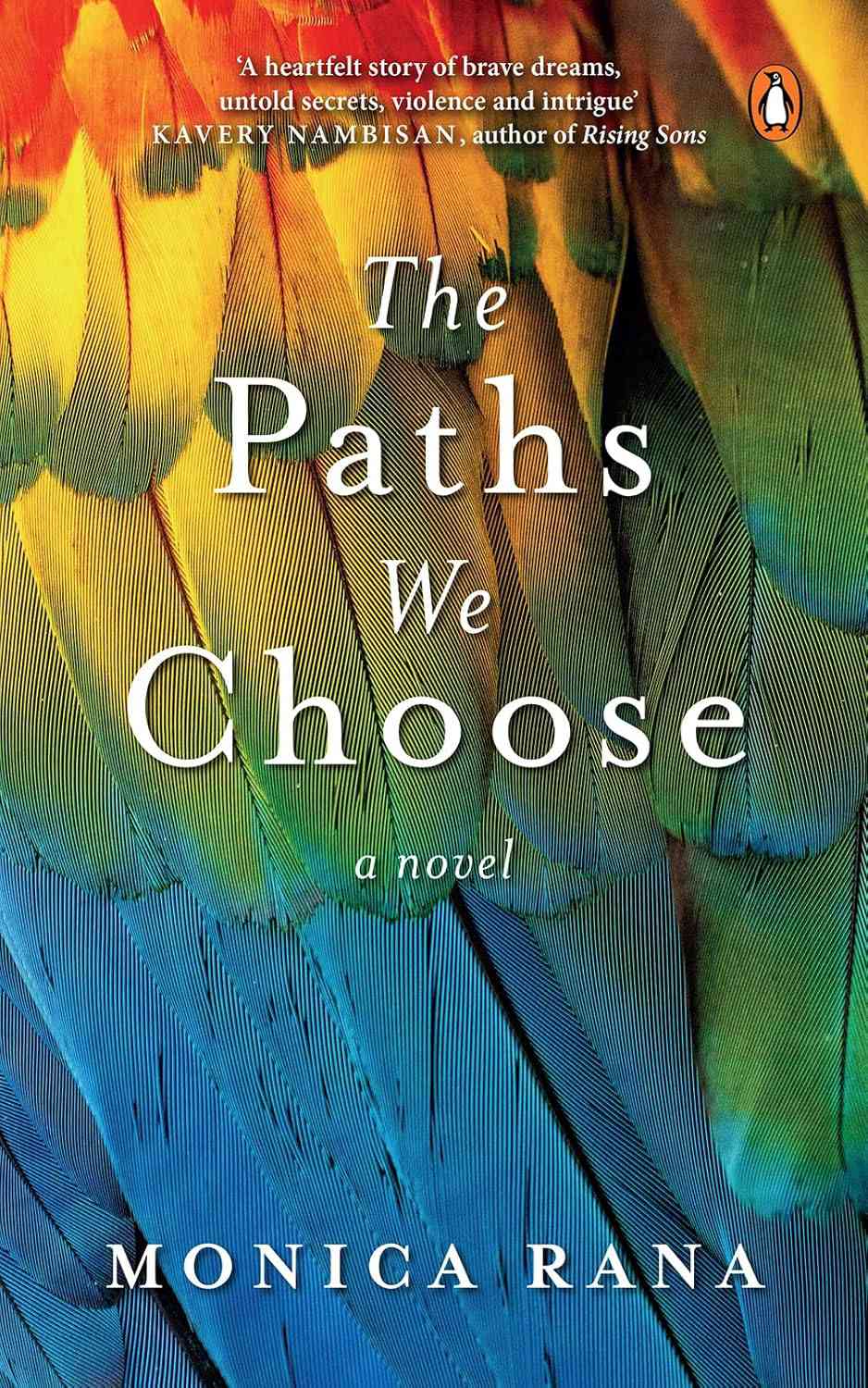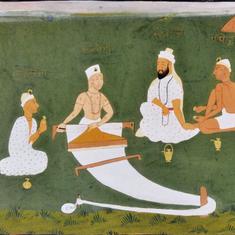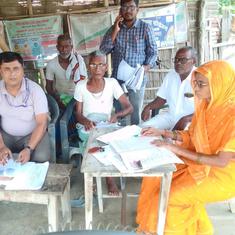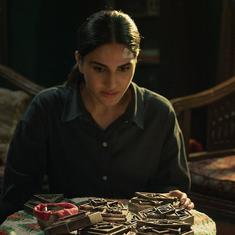It had been Sumnima’s idea to steal the mangoes. Everything of any real consequence always seemed to be Sumnima’s idea. And now here she was, racing ahead, charging through the trees, leaving Rita trailing behind, and all Rita wanted to do was to cry out. But her breath came in squeezing, muted gasps. Her ankles repeatedly twisted and buckled, the uncertain slap slap slap of her feet thundering at the centre of her ribcage. A hard outline of something sharp pierced through the worn sole of her rubber slipper. Then, an untimely thought: this Dashain, the biggest festival season of the year, when gifts were given and blessings received and the smell of charcoal-hot meat laced the air, she would ask Aama, her mother, for a new pair of slippers.
Ones with thick soles, made with fresh white rubber and bright blue straps that stuck out like ears. Ones that made you feel like you were permanently walking upon lightly packed soil that was just turned. Sumnima would, of course, laugh at the thought if she ever got to know. After all, it could never happen; Aama certainly didn’t have an extra rupee to spare. And now she could feel Dhire dai closing in on her with the angry swish of his stick that picked off skin from bare legs, leaving them as ripe and exposed as these mangoes she gripped, one in each hand.
That morning, Rita and Sumnima had awoken as usual in the quiet hours before dawn, hauled the gagris of water from the village tap a full twenty minutes away in the crisp air, fed the goats, cows and buffalo and picked the eggs. Then they cooked the first meal of the day: rice with watered daal, a boiled egg each and brinjal. She hated brinjal, the way it stayed slimy even after it was spiced and cooked, like eating the slugs that stuck to the bottom of rocks in the rainy season. Brinjal and gourd. That’s all they ever seemed to eat in Rato Mato village. If it was not brinjal season, then it was gourd season. Gourds round as bottles, the pointy kind, the bitter kind, the spongy kind and then the twisting long ones that could be mistaken for snakes from a distance. Even Dalle the buffalo was kept fat on a diet of brinjal and gourd.
While they sat outside sipping hot tea and watching the sun light up the hills, Sumnima suddenly stood up and said, “Let’s go!”
“Go where?”
“Dhire hill. The mangoes will be ripening now.”
“What? Dhire hill? If Dhire dai finds us, he will kill us!”
“Have you seen that Dhire dai lately? He’s old now. You think that old budha can outrun us? Stop being such a darcherua. Scared of your own shadow. Let’s go!”
Rita opened her mouth to protest. After all, weren’t they, too, old to be still climbing trees? But Sumnima had already turned her back, fitting her feet into her slippers.
Sumnima had a point. Dhire dai was rarely seen in the village these days, and the last time Rita had seen him, months ago at a festival, his hair had completely greyed. He looked even thinner than before, his knees sticking out beneath his lungi like thick knobs, covered in layers of loose folded skin. There was no way Dhire dai could outrun them. But as Rita picked herself up, dusting off her own skirt, she tried to ignore the list of things she had known all her life: to circumvent the swollen rivers in the monsoon, to watch out for snakes in the paddy fields, to avoid singular trees in a storm and, most of all, to stay clear of the fruiting forests high up on Dhire hill.
Sumnima lifted herself up the tree, clambering catlike from branch to branch with the same air of assuredness she had in everything that she did.
“Come on,” Sumnima called down, “what are you waiting for?”
Rita looked up and took measure of the tree. Unseen in the canopies, parrots teased and catcalled as if daring her to try.
“I …” she hesitated, “I don’t think I can … reach.”
“Stop thinking and just do it!”
She moved closer and peered up into the thickness. Yes, Rita tried to convince herself. She could climb as surely as Sumnima had just done, harnessing every branch, bending them to her will. And in fact, she would go even higher up just to prove that she could. She grabbed a branch and hoisted herself up.
But two branches up, her fear was back. A familiar sensation, one that she had carried ever since she was a child. The distances between the branches seemed to grow wider and now as she stood on one branch, she could see that the only way she could get on to the next one was if she swung herself up with her legs. Slowly, she balanced herself, careful not to look at how far up she really was, one hand sliding along the trunk as the other reached for the next branch overhead.
Above, Sumnima had disappeared into the leaves. Rita was on the very tips of her toes, her hands so wet with sweat as if she had plunged them right down the river. Her fingers tightened around the bark and just as she was about to reposition them, the branch jerked forward. Her feet kicked air, and she managed to readjust one hand just as the branch jerked again.
“Stop shaking the tree!” she shrieked at Sumnima, hidden from view.
“Shh!” came the answer, then another sharp jerk.
Rita was flailing in the air now, her toes unable to find the branch she had just been standing on. The bark seemed to melt between her fingers.
“Stop it, didi!” her voice rose in panic, “Stop it!”
“Shh! You want someone to hear you?”
Another sharp jerk sent one hand slipping off the branch and swinging wildly before finding the branch again. Just as she suddenly pictured herself lying face up and motionless on the ground, her toes finally touched rough bark.
She managed to hold on to the trunk when she heard the thud thud thud of ripening mangoes cascading on to the forest floor. And just as she dared to look down, realising with an embarrassing surprise that she had not been so high after all – there, just beyond the green fruits, burst open and spilling their yellow insides – she saw a pair of feet.
Rita held still. Above, the tree was also still. The pair of feet stood there, motionless, then took two steps into the sunlight and stopped again. The last boy who had ventured amongst these trees, years ago now, still had the scars to show for it and no one had tried since. But then, Dhire dai moved, one foot turning followed by the other, disappearing back into the foliage.
It was a few long minutes before she felt the tree vibrate as Sumnima scrambled back down its length.
“You see!” she whispered sharply, punching Rita across the arm as she swung herself towards the lower branches, “I told you to keep quiet!”
By the time Rita herself dropped from the lowest branch, feeling the infinite steadiness of the ground beneath, she was painfully stiff. She took a deep breath, pressed down her skirt, picked the two mangoes nearest to her that Sumnima had not already gotten, and put her slippers back on. That’s when it occurred to her; even if Dhire dai hadn’t seen them up in the branches, he must have seen their slippers, neatly arranged side by side at the base of the trunk! Rita opened her mouth to call out to Sumnima when, suddenly, the foliage behind her burst open – a strangled gargle followed by a deep-throated shout that sent a cacophony of bright green birds into shrieking flight and sent her slamming her slippers downhill, a mango squeezed in each hand.
“Bhag! Bhag!” he sounds followed her in hollowed, abrasive shouts, “Run away you thieves! You rotten, good-for-nothing thieves!”
She could almost feel Dhire dai’s hand upon her. The sudden jerk at her collar that would send her toppling backwards, tripping over her own feet. The taste of the forest floor in her mouth. The swish of a stick that sliced mercilessly through the air and brought with it instant tears.
Rita felt her feet start to give way, melting beneath her. If Dhire dai didn’t get her, she was sure her heart would burst open before she reached where the forest ended and the fields began.

Excerpted with permission from The Paths We Choose, Monica Rana, Penguin India.










